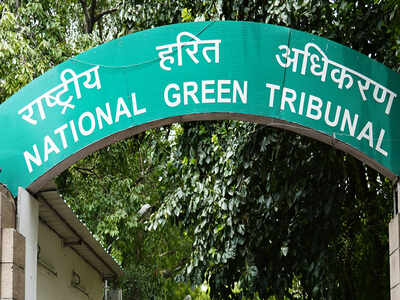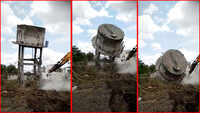
CHANDIGARH: While the Chandigarh administration is yet to upgrade sewage treatment plants (STPs) in the city, the latest ruling of the National Green Tribunal (NGT) has created more trouble for it.
In its latest order, the NGT had set up tough parameters for faecal coliform bacteria in STPs. While earlier the standard limit for faecal coliform bacteria was 230 most probable number (MPN), it has now been reduced to 100 MPN. The recent report of the Chandigarh Pollution Control Committee (CPCC) had highlighted alarming levels of faecal coliform bacteria in sewage treatment plants of the city.
The report, which the committee had shared with the municipal corporation, said the bacteria was a key cause of water-borne diseases, with the level touching 17 lakh MPN in all six plants of the city.
The judgment read, “We direct that the standards will apply not only for new STPs but also for existing/under-construction STPs without any delay… MoEF&CC may issue an appropriate notification within a month.”
A senior official of CPCC said the presence of faecal coliform bacteria in aquatic environments indicates that the water has been contaminated with the waste of humans or animals and it is an indicator of potential health risk. They had recently checked all six STPs in the city, he said.
The CPCC had also detected shortcomings in the functioning of four out of six sewage treatment plants. The four plants were releasing treated water with much higher bio-chemical oxygen demand (BOD) than the permissible level of the maximum 30 mg/litre. The latest report of January was compiled by the CPCC on the directions of the NGT, which has been keeping an eye on water pollution in the city.
The STPs situated in Raipur Kalan, 3BRD, Maloya and Diggian are managed by the engineering department of the MC, while the engineering department of the administration maintains the STPs in Raipur Khurd and Dhanas.
Of the six, four STPs — Raipur Kalan, Raipur Khurd, Dhanas and 3 BRD — are releasing treated water with more BOD level than the permissible limit of 30 mg/litre. The administration, in its action plan, had submitted that they would upgrade all STPs in the city by 2022, but the NGT panel had directed it to complete the job by 2020.
In August 2018, taking suo motu cognizance of media reports on pollution in the Ghaggar river, the NGT had directed the chief secretaries of Haryana, Punjab, Himachal Pradesh and Chandigarh to constitute a special task force (STF) to clean the river. The NGT committee in Chandigarh, along with officials of Chandigarh Pollution Control Committee, had visited various points of Sukhna Choe in Chandigarh.
In its latest order, the NGT had set up tough parameters for faecal coliform bacteria in STPs. While earlier the standard limit for faecal coliform bacteria was 230 most probable number (MPN), it has now been reduced to 100 MPN. The recent report of the Chandigarh Pollution Control Committee (CPCC) had highlighted alarming levels of faecal coliform bacteria in sewage treatment plants of the city.
The report, which the committee had shared with the municipal corporation, said the bacteria was a key cause of water-borne diseases, with the level touching 17 lakh MPN in all six plants of the city.
The judgment read, “We direct that the standards will apply not only for new STPs but also for existing/under-construction STPs without any delay… MoEF&CC may issue an appropriate notification within a month.”
A senior official of CPCC said the presence of faecal coliform bacteria in aquatic environments indicates that the water has been contaminated with the waste of humans or animals and it is an indicator of potential health risk. They had recently checked all six STPs in the city, he said.
The CPCC had also detected shortcomings in the functioning of four out of six sewage treatment plants. The four plants were releasing treated water with much higher bio-chemical oxygen demand (BOD) than the permissible level of the maximum 30 mg/litre. The latest report of January was compiled by the CPCC on the directions of the NGT, which has been keeping an eye on water pollution in the city.
The STPs situated in Raipur Kalan, 3BRD, Maloya and Diggian are managed by the engineering department of the MC, while the engineering department of the administration maintains the STPs in Raipur Khurd and Dhanas.
Of the six, four STPs — Raipur Kalan, Raipur Khurd, Dhanas and 3 BRD — are releasing treated water with more BOD level than the permissible limit of 30 mg/litre. The administration, in its action plan, had submitted that they would upgrade all STPs in the city by 2022, but the NGT panel had directed it to complete the job by 2020.
In August 2018, taking suo motu cognizance of media reports on pollution in the Ghaggar river, the NGT had directed the chief secretaries of Haryana, Punjab, Himachal Pradesh and Chandigarh to constitute a special task force (STF) to clean the river. The NGT committee in Chandigarh, along with officials of Chandigarh Pollution Control Committee, had visited various points of Sukhna Choe in Chandigarh.

Coronavirus outbreak
Trending Topics
LATEST VIDEOS
City
 On cam: Municipal corporation demolishes dilapidated overhead water tank in Gujarat’s Rajkot
On cam: Municipal corporation demolishes dilapidated overhead water tank in Gujarat’s Rajkot  UP: Pregnant woman out to relieve herself in a field gives birth, wild animal takes away newborn
UP: Pregnant woman out to relieve herself in a field gives birth, wild animal takes away newborn  Mumbai: Cop celebrates birthday at NGO office, enquiry ordered after video goes viral
Mumbai: Cop celebrates birthday at NGO office, enquiry ordered after video goes viral  On cam: Social distancing norms flouted in presence of BJP MP at Aligarh station in UP
On cam: Social distancing norms flouted in presence of BJP MP at Aligarh station in UP
More from TOI
Navbharat Times
Featured Today in Travel
Quick Links
Kerala Coronavirus Helpline NumberHaryana Coronavirus Helpline NumberUP Coronavirus Helpline NumberBareilly NewsBhopal NewsCoronavirus in DelhiCoronavirus in HyderabadCoronavirus in IndiaCoronavirus symptomsCoronavirusRajasthan Coronavirus Helpline NumberAditya ThackerayShiv SenaFire in MumbaiAP Coronavirus Helpline NumberArvind KejriwalJammu Kashmir Coronavirus Helpline NumberSrinagar encounter
Get the app





